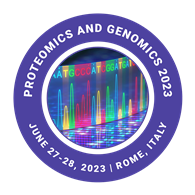Toxicogenomics and Pharmacoproteomics
Toxicogenomics: Toxicogenomics is a field of science that deals with the collection, translation and capacity of data about quality and protein movement inside specific cells or tissues of an organism in reaction to toxic substances. Toxicogenomics combines toxicology with genomics or other tall throughput atomic profiling advances such as Transcriptomics, proteomics and metabolomics. Toxicogenomics endeavors to illustrate atomic components advanced within the expression of harmfulness, and to determine molecular expression designs that anticipate harmfulness or the genetic helplessness to it.
Pharmacoproteomics: Pharmacoproteomics is a quickly progressing field in which the methods of proteomics are connected to develop pharmaceutical specialists. The word itself was coined only in 1997.
However, this branch of study plays a major part in personalized medicine. The word proteomics itself implies the study of proteomes, a proteome being the total complement of proteins expressed by an organism or tissue under specified conditions at an indicated time.
Proteomes are subsequently dynamic, and a given human may have a proteome with as numerous as two million proteins. The use of this full set of proteins to think about the impact of illness or drugs can substitute for much more complex measures in pharmacodynamics at a lower cost in time, financial yield, and clinical risk.
Related Conference of Toxicogenomics and Pharmacoproteomics
21th World Congress on Tissue Engineering Regenerative Medicine and Stem Cell Research
16th International Conference on Human Genetics and Genetic Diseases
19th International Conference on Genomics & Pharmacogenomics
Toxicogenomics and Pharmacoproteomics Conference Speakers
Recommended Sessions
- Biomarkers
- Cancer Epigenetics
- Cardiovascular Proteomics
- Clinical Genomics & Clinical Proteomics
- Computational Biology, Bioinformatics, and Biostatistics
- Computing in Biomedicine and Genomics
- E-Health, Telemedicine
- Genome Projects and Genome Sequencing
- Immunogenetics and Immunology
- Metabolomics and Metabonomics
- Metabolomics in Precision Medicine
- Modern Genetics
- Pharmacogenomics
- Protein Interactions in Biology
- Proteomics and Genomics
- Proteomics and its Medicinal Research
- Proteomics Technologies
- Signaling/Computational Biomedical Data Engineering
- Stem Cell Proteomics
- Toxicogenomics and Pharmacoproteomics
- Transcriptomics
Related Journals
Are you interested in
- 3D Bioprinting, Organ Fabrication & Bioartificial Tissues - Stem Cell 2026 (Netherlands)
- Aging Biology, Longevity Science & Cellular Rejuvenation - Stem Cell 2026 (Netherlands)
- Animal Genetics - Genome 2026 (Singapore)
- Artificial Intelligence and Computational Biology in Regenerative Medicine - Stemgen 2026 (Japan)
- Bioinformatics and Computational Biology - Genome 2026 (Singapore)
- Bioinformatics, AI Models & Predictive Regeneration - Stem Cell 2026 (Netherlands)
- Biomarkers and Microarrays - Genome 2026 (Singapore)
- Biomaterials and Nanotechnology in Regenerative Medicine - Stemgen 2026 (Japan)
- Cancer Genomics - Genome 2026 (Singapore)
- Cancer Stem Cells & Targeted Therapeutics - Stem Cell 2026 (Netherlands)
- Cancer Stem Cells and Oncology - Stemgen 2026 (Japan)
- Cardiac, Vascular & Musculoskeletal Regeneration - Stem Cell 2026 (Netherlands)
- Cardiovascular Regeneration - Stemgen 2026 (Japan)
- Clinical genomics - Genome 2026 (Singapore)
- Clinical Translation of Stem Cell Therapies - Stem Cell 2026 (Netherlands)
- Clinical Trials and Translational Stem Cell Research - Stemgen 2026 (Japan)
- Commercialization, Biobanking & Industry Innovations - Stem Cell 2026 (Netherlands)
- Comparative Genomics - Genome 2026 (Singapore)
- Epigenomics and Epigenetics - Genome 2026 (Singapore)
- Ethical, Legal, and Social Implications in Stem Cell Research - Stemgen 2026 (Japan)
- Ethical, Regulatory & Quality Control Frameworks - Stem Cell 2026 (Netherlands)
- Exosomes, Extracellular Vesicles & Cell-Free Therapeutics - Stem Cell 2026 (Netherlands)
- Functional Genomics - Genome 2026 (Singapore)
- Future Trends: Organoids, Bioengineering, and Next-Generation Therapies - Stemgen 2026 (Japan)
- Gene Editing and CRISPR Technologies - Stemgen 2026 (Japan)
- Gene Editing and Genetic Engineering - Genome 2026 (Singapore)
- Gene Editing, CRISPR Therapies & Regenerative Genomics - Stem Cell 2026 (Netherlands)
- Genetic Disorder - Genome 2026 (Singapore)
- Genomic Instability - Genome 2026 (Singapore)
- Genomic Medicine - Genome 2026 (Singapore)
- Induced Pluripotent Stem Cells (iPSCs) and Reprogramming - Stemgen 2026 (Japan)
- Mesenchymal Stem Cells (MSCs) in Therapy - Stemgen 2026 (Japan)
- Microbial Genomics - Genome 2026 (Singapore)
- Next generation sequencing - Genome 2026 (Singapore)
- Nutrigenomics - Genome 2026 (Singapore)
- Personalized and Regenerative Medicine - Genome 2026 (Singapore)
- Pharmacogenomics - Genome 2026 (Singapore)
- Plant Genomics and Molecular Pharming - Genome 2026 (Singapore)
- Regeneration in Neurodegenerative & Spinal Cord Disorders - Stem Cell 2026 (Netherlands)
- Regenerative Approaches in Diabetes & Metabolic Disorders - Stem Cell 2026 (Netherlands)
- Regenerative Dentistry and Craniofacial Applications - Stemgen 2026 (Japan)
- Regenerative Immunology & Immune Modulation - Stem Cell 2026 (Netherlands)
- Regenerative Medicine and Tissue Engineering - Stemgen 2026 (Japan)
- Stem Cell Banking and Cryopreservation - Stemgen 2026 (Japan)
- Stem Cell Biology and Cellular Mechanisms - Stemgen 2026 (Japan)
- Stem Cell Engineering & Cellular Reprogramming - Stem Cell 2026 (Netherlands)
- Stem Cells in Neurological and Neurodegenerative Disorders - Stemgen 2026 (Japan)
- Structural Genomics - Genome 2026 (Singapore)
- Tissue Engineering, Biomaterials & Smart Scaffolds - Stem Cell 2026 (Netherlands)
- Trends in Genomics and Pharmacogenomics - Genome 2026 (Singapore)

